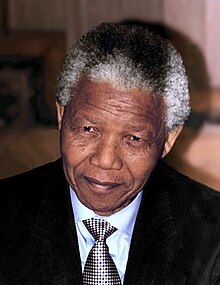
The life and work of ...(intermediate)
Objective: Learners acquire knowledge about the life and work of a selected person from history.
Content and methodology: Learners read a basic text and are able to answer comprehension questions based on this and place the life and work of the person in the context of society as a whole.
Competences:
- Reflection and discussion of the relevance of the selected person
Level: Upper school (11th - 13th grade)
68 other teachers use this template
Target group and level
Upper school (11th - 13th grade)
Subjects
The life and work of ...(intermediate)

Info
This worksheet offers you exciting insights into the work and achievements of people who have changed the world. Explore their challenges, successes and the influence they still have on our society today.
📋 Assignment
Read the following text to gain an initial insight into the person's life. Then complete the task.
From Prison to Presidency: The Legacy of Nelson Mandela

Source: Wikipedia
Nelson Mandela, born on July 18, 1918, in Mvezo, South Africa, is celebrated as a pivotal figure in the fight against apartheid. As a lawyer and anti-apartheid revolutionary, Mandela spent 27 years in prison, enduring harsh conditions and emerging as a symbol of resilience and justice. His imprisonment on Robben Island and subsequent release in 1990 were turning points in South African history.
Mandela's presidency, beginning in 1994, marked the nation's transition from apartheid to a democratic society. He became South Africa's first black president, leading a government focused on reconciliation and nation-building. Despite his advanced age, Mandela's leadership was characterized by his dedication to dismantling apartheid's legacy and promoting racial harmony.
One of his notable achievements was fostering unity through sports, symbolized by his support for the predominantly white South African rugby team during the 1995 Rugby World Cup. Mandela's gesture of wearing the team's jersey and presenting the trophy to the team captain was a profound act of reconciliation.
Mandela's tenure was not without challenges. Critics argue that his administration struggled to address the HIV/AIDS epidemic effectively, a regret Mandela later acknowledged. Moreover, his economic policies, while stabilizing, did not fully address the deep-seated inequalities in South African society.
Mandela's legacy as a global icon of peace and justice endures, reflecting his extraordinary journey from prisoner to president and his unwavering commitment to human rights and equality. His life remains a testament to the power of forgiveness and the enduring struggle for justice.
Lade Zeichenfeld...
📋 Assignment
Answer the questions by gathering information from the text.
📋 Assignment
Read the following quote and then answer the question. If you need help, check the text again.
"If there is a country that has committed unspeakable atrocities in the world, it is the United States of America. They don't care for human beings." - Nelson Mandela
Solutions
Here are solutions for the teacher.
1918: Birth in Mvezo, South Africa
1990: Released from prison
1994: First black president of South Africa
1995: Supports South African rugby team in Rugby World Cup
1999: End of the presidency